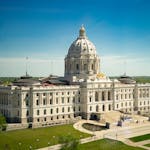Even though we live in the self-disclosure age of Twitter, most people don't want the government or their employers rummaging around in their personal e-mails or medical records. We still value some modicum of privacy in our daily lives.
Yet Minnesota legislators, who lack any compelling state interest, are on the verge of forcing many Minnesota voters to align themselves with the Democratic or Republican parties. And they want to make those affiliations public information. Under current legislation, those are the terms Minnesotans would have to accept if they want to vote in a presidential primary election.
This complete violation of voter privacy, which Minnesotans should not tolerate, would occur if the Legislature and Gov. Mark Dayton enact a "closed" presidential primary bill making its way through the legislative process.
Minnesota voters historically have had high voter turnouts because the state has enjoyed a robust level of civic engagement, and voting laws have encouraged voting. These laws have not been used to erect participation barriers.
Scrapping the presidential preference votes at caucuses and shifting to a presidential primary makes good sense, because it would broaden the pool of citizens casting ballots. At the 2016 precinct caucuses, about 320,000 Minnesotans showed up for the Republican and DFL parties' caucuses. Although that number is a small fraction of the Minnesota electorate, it was a strong turnout for caucuses, and party volunteers had a tough time handling that huge flow of voters for evening gatherings.
Nearly 2.9 million Minnesotans voted for Barack Obama or Mitt Romney in the 2012 general election. If Minnesota had a presidential primary in place this year, there likely would have been an excellent turnout, because there are highly competitive contests in both major parties. In a primary setting, substantially more than 320,000 people would have weighed in on their preferences for party nominees, because polls would have been open all day and voting would have been convenient.
But a presidential primary, as proposed in a current bill, would repel many voters. If Minnesota enacts a "closed" presidential primary, election officials would maintain voter lists by party affiliation. The lists would be subject to public inspection by people associated with "elections" or "political activities." In effect, Minnesota taxpayers would be paying election officials to generate fundraising lists for the Republican and DFL parties.
There's a simple solution that serves the best interests of all voters. Amend the bill to establish an "open" presidential primary, which builds on Minnesota's long success of holding "open" primaries for state offices. When you are voting in an "open" primary, you get a ballot that contains candidates from multiple parties. But each voter can vote only for candidates from one party.
Suffice it to say that Minnesota has a healthy share of independent voters, and many of them cast ballots in state primary elections. Many Minnesotans are split-ticket voters in the general election, but they want to exercise their voting franchise in primary elections as well. These people should be welcomed at presidential primary polling places. They should not be forced to "go public" about which party they supported in the election. County auditors also shouldn't be required to keep party-affiliated voter lists, which would be used by political parties for incessant fundraising appeals and get-out-the-vote drives.
Since 1998, Minnesotans have elected governors from three political parties. Clearly, party leanings are fluid for many voters. Yet people who aren't hard-core Democrats or Republicans should have a right to vote in primaries that determine candidates for the general election.
In 2010, 442,137 people voted in the DFL gubernatorial primary, in which Mark Dayton narrowly defeated Margaret Anderson Kelliher and far outdistanced Matt Entenza. In the 1994 gubernatorial primary, 482,754 Republican ballots were cast, and incumbent Arne Carlson trounced party endorsee Allen Quist.
Minnesotans were highly engaged in those "open" primary contests. They should be given the same opportunity to vote in "open" presidential primaries, instead of going down the disturbing path of "closed" primaries.
Liz Fedor, a Twin Cities-based journalist, recently served as a residential fellow at the McCarthy Center for Public Policy & Civic Engagement at St. John's University in Collegeville, Minn.



